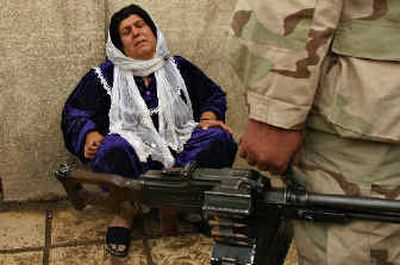Suicide bombing in north kills 60 Iraqis

IRBIL, Iraq – A suicide attacker slipped into line at a police recruitment center in this usually tranquil northern Kurdish city and blew himself up Wednesday, leaving the streets slick with blood in the deadliest insurgent attack in more than two months, police said. Sixty Iraqis were killed and 150 wounded.
The explosion, part of an escalation of violence aimed at destabilizing the country’s new democratic government, left pieces of flesh spattered on the outside walls. Nails and shards of metal were packed in with the explosives to maximize casualties.
A Sunni militant group, Ansar al-Sunnah Army, claimed responsibility, saying the attack was revenge for Kurdish cooperation with U.S. forces.
Militants frequently target security forces and recruits, leaving Iraq’s government grappling with how to stabilize the country. As of Monday, at least 616 Iraqi police had been killed this year, according to statistics compiled by the Brookings Institution in Washington, D.C.
In Irbil, 215 miles north of Baghdad, some 250 job seekers were waiting to be searched outside the recruitment center when the bomb went off, police Capt. Othman Aziz said. An Iraqi insurgent joined the line and detonated explosives concealed on his body, he said.
Panicked relatives crowded into the Irbil Teaching Hospital, where staff used loudspeakers to announce victims’ names and room numbers. Women squatted on the ground wailing and beating their chests.
“Oh God, what did we do wrong?” Horras Mohammed Amin screamed from his hospital bed, his face and leg bloodied from the attack.
The 25-year-old was standing near the end of the line when the blast threw him into the street. “I wanted to find a job because it is very shameful for a young man like me to take money from his father,” he said.
Hawra Mohammed had just dropped off his 32-year-old brother, Ahmed, when he heard the explosion and came racing back. He nearly fainted at the sight of so many bodies in the street, but found Ahmed alive, though unconscious and bleeding, he said.
“I lifted my brother onto my shoulders and took him to a nearby hospital. The blood on my shirt is my brother’s,” Hawra said.
The U.S. military put the toll at 60 dead and 150 wounded in the attack. Nearly 200 people have been killed in insurgent violence across Iraq since the new government was announced last week.
It was the deadliest attack in Iraq since Feb. 28, when a suicide car bomber struck a crowd of police and national guard recruits in Hillah, south of the capital, killing 125 and wounding more than 140.
Training Iraqi police and military forces to take primary responsibility for security is a key part of the U.S. exit strategy in Iraq.
Attacks against security forces have become so frequent in Baghdad and other major centers that most recruitment centers are surrounded by protective blast walls. But the northern Kurdish areas usually have been spared the worst of the violence, in part because members of the Sunni Arab minority believed to be driving the insurgency stand out and are closely watched.
Ansar al-Sunnah, in its statement posted on a militant Web site, claimed the attack was a car bombing and said it was staged to punish Kurdish security forces that have “bowed their heads to the Crusaders and raised their spears against the Muslims and fought alongside the Americans.”
There was no bomb crater in the street, as there normally would be after a car bombing.
Ansar al-Sunnah is believed to be a breakaway faction of Ansar al-Islam, a Kurdish-led group with links to al Qaeda. It has claimed responsibility for numerous attacks against Iraqi security forces and twin suicide bombings targeting Kurds in Irbil that killed 109 people in 2004.
Insurgents have stepped up their attacks since a new Cabinet was approved last week.
Prime Minister Ibrahim al-Jaafari hoped to include members of the Sunni minority, which dominated under Saddam Hussein, in his government. But members of his Shiite-dominated alliance have blocked candidates with links to Saddam’s regime, which brutally repressed Shiites and Kurds.
After months of wrangling, the 37-member Cabinet included just four Sunni ministers in relatively minor posts. Bickering continues over seven positions, including the oil and defense ministries, which remain in temporary hands.
Hoshyar Zebari, a Kurd who is foreign minister, conceded the political vacuum of the last three months may have given impetus to the insurgency.
“We’re facing a security problem. We need to do a better job,” he told the Associated Press by telephone. “Now that we’ve formed the government, we want to gain momentum again.”
Sunni lawmakers and religious leaders condemned the attack in Irbil.
“This is an inhuman operation, killing the sons of the land who were coming to protect Iraq,” said lawmaker Mohsin al-Jarwa.